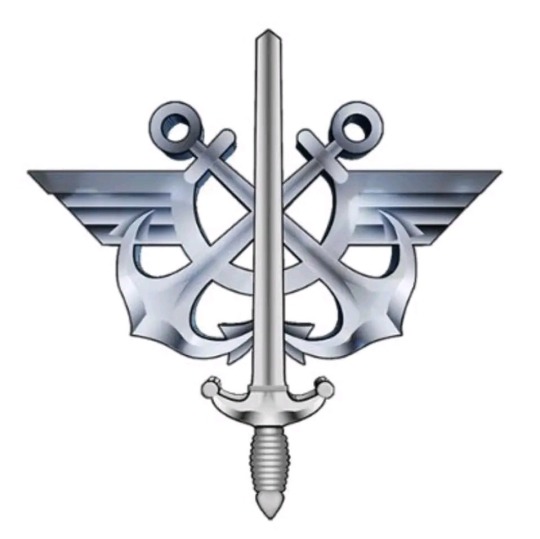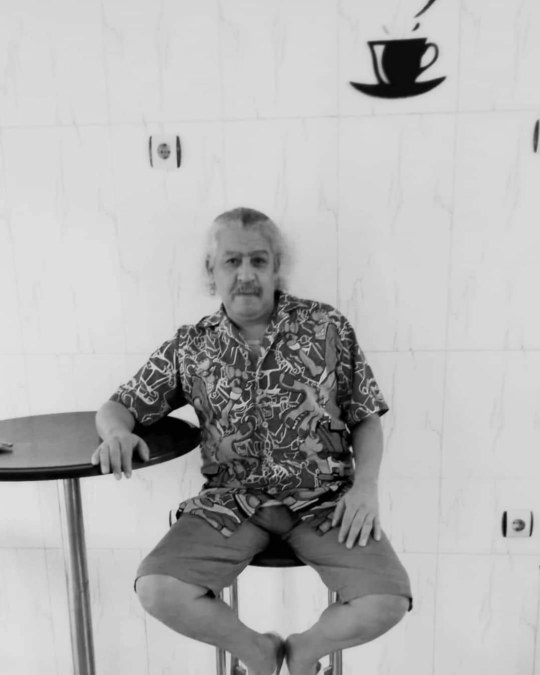#petain
Text
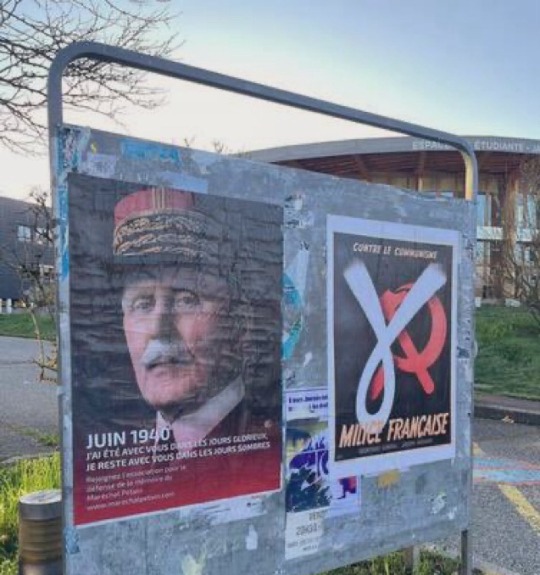
Extrême droite décomplexée.
4 notes
·
View notes
Link
Choking on your crêpes
#France#history#WWII#collapse#fascism#Vichy#Petain#Nazi collaboration#colonialism#corporations#cartels#finance
0 notes
Text
“If any of us thought we could do our fellow creatures good by committing or, more probably, condoning an evil act, would we do so? Would we even recognize the moment when it happened, or accept that it was evil? Most of us are wonderfully good at persuading ourselves that our actions are pure. Does treason actually exist or, as Talleyrand quipped, is it just a matter of dates? Worse, is it a process of human sacrifice, in which exposed individuals are singled out to pay for the sins of thousands—who escape punishment? Switch allegiance at the right moment, or die opportunely, and you may be spared centuries of shame. Live too long, or cling to the wrong raft and your name will be a byword and a hissing. I suspect that Talleyrand, living in a wittier and less dogmatic age, might have reflected that Marshal Philippe Pétain was just unfortunate in his timing.
From this perspective, Pétain’s mistake was to carry on living after the fall of his Vichy State during the last grisly months of the Third Reich. If he had managed to die (he was after all 88) then he would have escaped much humiliation. If he had been shot out of hand by French resisters, a lot of scores would have been neatly settled. (Winston Churchill thought this would have been a much better way of dealing with the actual Nazi leadership than the dubious Nuremberg trials with their Soviet prosecutor). But, as Julian Jackson recounts in his book about Pétain’s surrender, trial, condemnation, and lifelong imprisonment, the old soldier more or less sought out his fate. The Germans had carried him off to the Reich. But Pétain found his way back to France, so compelling De Gaulle and his provisional government to put him on trial for treason. To do so, it had to reopen the whole bitter period, in which many apart from Pétain had behaved weakly, or dishonorably, or just mistakenly. As the title of this book reminds us, France was on trial alongside Pétain.
(…)
The shepherd, the argument runs, is supposed to stay and tend his sheep when the danger is at its worst, not to flee abroad—even if he eventually returns triumphant. Did Pétain perhaps stand between the French people and the full wrath of their conquerors? He may have thought so, at least to begin with. And when he spoke of “collaboration” with Hitler, the word did not seem to mean what it later came to mean.
But, as it happened, Pétain did not stand between the French people and their Nazi occupiers. He became their all-too-willing servant. We now know beyond doubt that Marshal Pétain’s Vichy state enthusiastically offered collaboration to the Nazis, so much so that the Germans actually rebuffed it. It had even suggested its own persecution of the Jews, rather than reluctantly given in to German pressure. In 1972 an American historian, Robert Paxton, obtained German documents on the Occupation which left no doubt about this. Pétain’s supposed “National Revolution” closely collaborated with the fiends and demons of the Third Reich and vigorously urged on one of its ugliest policies. Anybody who has any serious interest in Pétain now knows all this.
But they did not know it when it mattered most, when Pétain and France were on trial in 1945, or for some time afterwards. In fact, Pétain died in custody in 1951 before the facts were wholly known. Jackson’s book on the French state’s 1945 prosecution of Pétain contains a lengthy passage on Paxton’s discoveries. But it rightly leaves them until long after this extraordinary process was over and the Marshal slept with his fathers. So Jackson is able to treat seriously several French citizens, lay jurors, journalists, politicians—and Pétain’s brilliant, dangerous and inconvenient lawyer, Jacques Isorni. All these were determined to give the old man some semblance of fairness, at a time when violent hysteria would have been quite possible instead. Remember, it was not long since the repellent and chaotic epuration (purge) of actual and alleged collaborators after the German defeat in which wild, violent street “justice” was imposed on some of those believed to have been too helpful or friendly to the occupying power, especially the public shaving of women’s heads, not a brave action whatever else it was. France’s Communists, in particular, were keen to condemn the conservative Catholic Pétain as a national traitor comparable to the reviled Marshal Bazaine of the Franco-Prussian war. They published propaganda showing him dangling at the end of a hangman’s rope and urged the imposition of the death penalty.
(…)
It was not just Denmark where this sort of thing happened. British sneering at the weakness and cowardice of continentals under the jackboot is also badly shown up by the curious, embarrassing and largely-forgotten German occupation of the British Channel Islands in 1940. “But what would you have done?” the islanders ask their mainland critics, to this day. The islands’ local authorities were cut off from the British constitution and government when Churchill brusquely abandoned them as indefensible after Dunkirk. Suddenly these largely conservative gentlemen, some nearly as elderly as Pétain, found themselves implementing the decrees of the Third Reich rather than those of His Majesty the King. They felt they had little choice but to work with the German occupiers. Where can a resistance movement hide on a tiny island?
But compromise leads to compromise and to worse compromise. Some of their leading officials ended up cooperating in terrible acts, such as the deportation of local Jews to Auschwitz. Those who survived this distressing period are understandably angry about criticism from safe mainlanders who never saw a German soldier on their streets. When the author Madeleine Bunting wrote a severe account of the islands’ subjugation, The Model Occupation, she met much resentment from those who had experienced it. But I wish this story was better known so that boastful and ignorant British people would stop mocking the supposedly cowardly French for their collaboration in the Vichy period. The fate of the islanders suggests that it would have been the same for the British, if Hitler had ever got ashore.
(…)
Despite the French Communists’ righteous wrath at Pétain, they had their own highly embarrassing secrets from the era. This is hugely significant because of the undoubted (and gravely mistaken) attraction of the Pétain regime for French conservatives and Catholics. His national motto of Travail, Famille, Patrie, replacing the Republican Liberte, Egalite, Fraternite, made it plain that this was not just a necessary co-operation with a new master, but an attempt to overturn many of the principles of the French Revolution. To this day, some figures on the political right in France seek to defend Pétain, the most recent being the failed presidential candidate Eric Zemmour, who most unwisely and inaccurately sought to defend Vichy’s policy, for supposedly saving French Jews by sacrificing recently arrived Jewish refugees to the Nazis. Why would anyone bother to do this? Could it be because of an actual lingering sympathy with Pétain’s social policies?
The Communist attempts at collaboration with the Germans were (like Vichy’s active anti-Jewish behavior) not widely known at the time of Pétain’s trial. Julian Jackson discussed the Communist approach to the German occupation authorities in another work on France’s occupation period France: The Dark Years 1940-44. For many years after the war the episode was little more than a bitter Trotskyist rumour, but it has now taken solid form in serious research. To even begin to comprehend it you must recall that in May 1940, as France’s democratic government collapsed and Nazi power swept into Paris, the Nazis and the Communists were allies against the democracies, thanks to the Molotov-Ribbentrop Pact of August 1939, which would endure until June 1941 and was far more than a brief flirtation. The previous September, there had been a joint Wehrmacht and Red Army victory parade over Poland in the city of Brest-Litovsk (pictures still exist of German and Soviet officers happily communing as they take the salute). Not long afterward the two worst secret police forces in the world, Hitler’s Gestapo and Stalin’s NKVD, exchanged prisoners, as each wanted to get their hands on persons the other had arrested. Much of the fuel and material used in the German Blitzkrieg against the European democracies in May 1940 had come from or through the USSR.
The French Communist Party was therefore considered a pro-enemy body by the French state. It was banned and its daily newspaper L’Humanite shut down. The French Communists brushed aside rumors of their behavior for long after the war, and their considerable power and popularity in Gaullist France allowed them to get away with doing so. But scholarship has now caught up with them. Beyond doubt, French Communists went voluntarily to the Nazis and sought permission for the re-issue of their newspaper. Apparently the Comintern, then the central headquarters of all Communist Parties, was taken by surprise by the French defeat in 1940. It did not know how to respond. The leaders of French Communism had been dispersed by the proscription of their Party, and were in hiding or abroad. But some heavyweight commissars, Jacques Duclos, Jean Catelas, and Maurice Treand, wondered if the fall of the French state might be a chance to recover their organization’s lost influence. This was in the Leninist tradition of ruthlessness and of scorn for patriotism and other such bourgeois notions.
The negotiations involved the subtle French-speaking Otto Abetz, Germany’s future ambassador to Vichy France. Treand and Catelas promised, Jackson writes, that if allowed to reappear, the Communist daily would “pursue a policy of European pacification” and “denounce the activities of the agents of British imperialism.” Underground editions of the paper (secretly printed since September 1939) published three articles in the summer of 1940 praising fraternization between French workers and the Germans. Perhaps these were aimed at persuading the Germans to allow open publication. Who can now say?
As so often in history with things that nearly happened, it is like watching a ghost begin to appear, and then disappear again. There was surprising sympathy for collaboration on both sides in France. Some conservatives loathed England, hoped for a British surrender, and thought Hitler was better than socialism. Some Communists suspected that Hitler might be kinder to them than democracy had been. Only as the occupation hardened, and as the French Communist leader in exile, Maurice Thorez, reasserted control, did the Communists end the talks. They did so very shortly before the Germans also went off the idea, though it was a close-run thing. One Communist, Robert Foissin, was made an internal scapegoat by the Party—which belatedly realized how embarrassing the talks would one day become. But Duclos was too important for such treatment. He would live to be the Communist candidate for the Presidency of France in 1969. No wonder that in 1945 the Communists—now covered in glory because of their post-1941 Resistance role—wanted to draw eyes away from their own behavior in 1940, and concentrate instead on the wickedness of the Catholic, conservative Pétain.
(…)
In truth, France was on trial in 1945 more than Pétain. And France emerges from the trial with perhaps a little more credit than we give it. This at least was not a howling enraged tribunal, as the Communists might have desired, but a genuine attempt to apply due process and so to restore some sort of legitimate stability. De Gaulle’s view of the old man was that he was a living corpse who had died to all intents and purposes in 1924. Probably those in French politics who (perhaps too willingly) let him take responsibility for making peace with Germany had a similar view. He was a cypher, not a person. Those who seriously imagined that he was the head of a conservative national revolution were deluded at the time, and those in modern French politics who suggest the same are equally deceived, though it now seems fairly certain that the Marshal was, more often than not, conscious of what was going on around him and aware of what was done in his name. His reprieve from execution was not only a recognition that he was too old to face a firing squad. It was a humane compromise between the De Gaulle and Pétain factions which still haunt French public life in surprising ways. After all, the Socialist President Francois Mitterrand served and was honored by the Vichy regime, yet lived to prosper. The far more brutal fate of Pétain’s colleague Pierre Laval, shot after a brief and undignified hearing and a botched suicide, probably satisfied the general desire to erase the shame and discomfort of the collaboration years which Mauriac had identified. How pleased any reader of this book must be that he and his country did not undergo such misery. Do not be defeated in war. Defeat corrupts the defeated, and it is far harder than we think to stand above the grim process. Pray that it never happens to you.”
“One of the greatest challenges human beings face is how to tease apart a bad act from a good character — or, conversely, a toxic personality from the good and worthy things he created. How do we separate the long-time childhood friend from his insane Facebook polemics? The good neighbour from his bad politics?
“People are thoughtless all the time,” writes Alexandra Hudson in her new book, The Soul of Civility, while arguing that the best way to depolarise our society is to recognise that good people can have bad ideas. This idea is classically Christian, but also fundamentally American: even after the Civil War, a central tenet of Reconstruction was that those who fought for the Confederacy should be given grace for having chosen the wrong side. But that’s a principle it’s easier to hold to in the wake of victory than in the fog of war — or, as this past week’s events have reminded us, War Discourse.
The response from certain corners of the progressive Left to the stories coming out of Israel has been extraordinary. The silhouette of a paragliding Hamas militant has been adopted by groups ranging from Black Lives Matter to the Democratic Socialists of America — a graphic successor to that Che Guevara block print that used to hang on every dorm room wall. A crowd on the steps of the Sydney Opera House in Australia chanted “gas the Jews”. A cheer went up in Times Square at the news that 700 Israelis had been killed. And among the academic and media classes, a series of statements ran the gamut from half-hearted condemnations of the terrorist attacks to triumphant and bloodthirsty snarling.
“What did y’all think decolonization meant? vibes? papers? essays? losers,” wrote Najma Sharif, a writer for Soho House magazine and Teen Vogue. “Today should be a day of celebration for supporters of democracy and human rights worldwide,” tweeted Rivkah Brown of Novara Media. The language varied, but the sentiment was the same: this is good, actually, and seeing it should fill you with the same cathartic glee as any underdog story. Don’t you see? This isn’t terrorism; it is justice.
(…)
The war in Israel, and the one in Ukraine: it’s not hard to see how our distance from these events, combined with the immediacy of so much coverage and conversation about them, lends itself to the most grotesque kind of rubbernecking. It’s war as spectator sport; people haggle over the reports of Hamas beheading babies with the same energy as a group of armchair referees debating an off-side call.
Some people, anyway. The term “luxury beliefs” was coined to describe how privileged progressives like to traffic in this sort of unhinged extremist rhetoric. Partly, it’s a hazard of their utter insulation from ever having to experience the practical impact of the policies they advocate. Violence and chaos have a way of breaking through the barriers that separate the ivory tower-dwellers from the masses they condescend; one imagines the occupants of Versailles looked out their windows at the guillotine being constructed in the public square and, not understanding what lay in store, pronouncing the structure adorable.
But it’s also what happens when you succumb to the Manichean worldview that every conflict, every issue, boils down to a simple question of who is the more oppressed party. Whichever guy has more privilege, more power: this is your villain. In trying to topple him from his unearned position of influence, his victim can do no wrong. Hamas, composed as it is of Muslim people of colour, is merely punching (and raping, and kidnapping) up.
While the attacks on Israel have given rise to a particularly stomach-turning iteration of this rhetoric, we have seen it before. In 2020, as the US protests against police violence spiralled out of control, members of the laptop class could reliably be found posting that Martin Luther King Jr quote about riots being “the voice of the unheard” — always from the safety of their homes, in nice neighbourhoods, in coastal cities, where things were conspicuously not on fire. The people looting, rioting, and wreaking havoc were members of an oppressed class, and hence above reproach.
But the most absurd example of how true-life horrors become grist for the mill of perverse progressive fantasy popped up downstream of the “decolonisation” discourse. Every now and then, someone announces on the internet that they would begrudgingly allow themselves to be murdered if Native Americans decided to violently re-exert ownership over their ancestral lands. The authenticity of such sentiments is obviously belied by the fact that these same people could, if they wanted to, voluntarily renounce their power instead of waiting for some noble savage to take it by force. If you truly believed yourself to be a colonist, illegitimately squatting on someone else’s property, why would you waste time tweeting about it? Wouldn’t you just leave?
(…)
If civility demands that we hold people to account for the hatred they spew, it also rejects the notion that a person of an “oppressed” identity category should get a free pass to spew hatred. The bar for human decency, surely, does not shift depending on the colour of your skin or the arrangement of your genitals — and to insist on this, on one standard for all people, creates a clear path forward, which may be the best thing about civility as an ethos. It works on the assumption that, as bleak as things are now, there will be an “after” in which we forgive, even if we don’t forget.
(…)
As I left Hudson’s event on Tuesday night, I found the street closed off. Instead of cars, the pavement was occupied by hundreds of people holding signs and banners and flags: the remnants of what had been a massive rally in support of Israel. I would later learn that some people present were captured on camera wishing for the annihilation of Palestine; no one side, as it turns out, has a monopoly on hatred.
As I weaved through the crowd, Leonard Cohen’s “You Want it Darker” was playing through my headphones, a fitting meditation on war, death, and the cruelty we inflict on each other in the name of a just cause.
They’re lining up the prisoners
And the guards are taking aim
I struggle with some demons
They were middle-class and tame
I didn’t know I had permission
To murder and to maim
The chorus to this song is a Hebrew word, a line from the Torah. It’s what Abraham says, in response to God’s request that he sacrifice his son; it is also what we might say to each other, eventually, when civility or decency or whatever deity you believe in asks us to confront and forgive each other’s failings in this moment, the better to thrive in the moments we have left.
Hineni, hineni. I’m ready, I’m ready.”
#hitchens#peter hitchens#petain#pétain#marshall petain#vichy#germany#france#collaborators#collaboration#nazis#antisemitism#rosenfield#kat rosenfield#israel#palestine#gaza#hamas#woke#leftism#communists#french communists#molotov ribbentrop pact#leonard cohen#you wanted it darker
1 note
·
View note
Photo

"À l'Ouest, Rien de Nouveau" d'Edward Berger (2022) - d'après le roman éponyme d'Erich Maria Remarque (1929) - avec Felix Kammereret, Albrecht Schuch, Moritz Klaus, Aaron Hilmer, Edin Hasanovic, Devid Striesow, Daniel Brühl et la participation de Thibault de Montalembert, février 2023.
#films#WWI#spirit#Berger#Remarque#Kammereret#Schuch#Klaus#Hilmer#Hasanovic#Striesow#Bruhl#Montalembert#Petain#Foch#Erzberger
1 note
·
View note
Text
Shemale Ass Teasing
Craigslist slut fucks me
Hawt doctor begins making out right in the fake hospital
negrona guapa cuarentona hermosa
Sexy teen darling gets lanced by big cock
Homemade milf sex tape
Flexible ebony whore with long legs Capri allows to leave cum in ass
Crying pain bdsm Adrian Maya is a tastey piece of butt with her
She loves to sniff and lick my ass - Lesbian_illusion
Nikki Bella Sexy
#arrestor#adfluxion#well-graven#Petain#miaowed#readdressing#efficace#Yurupary#microtomical#un-Latinized#cromfordite#six-colored#navigabilities#gibbose#engorge#multivalved#Braggadocio#sulphoichthyolate#preseparation#prefixture
0 notes
Text
Gozada perfeita dentro da buceta da casada
Sex beautiful young boys videos and gay who love big dick anal He
Big ass white girl
Japanese Nuru Massage
Gym punishment first time Cummie, the Painal Cum Cat
Comendo buceta e gozando dentro do cu
Insatiable blonde milf, Sophia Mounds fucked her neighbor next door
porno casero gay
SISSY RIDING BBC HOMEMADE
Gay twink jordan jay Fucking Student Boy Aaron
#Plotinus#proficiently#to-drive#battute#arrestor#adfluxion#well-graven#Petain#miaowed#readdressing#efficace#Yurupary#microtomical#un-Latinized#cromfordite#six-colored#navigabilities#gibbose#engorge#multivalved
0 notes
Note
Why did De Gaulle keep Petain from getting executed after WWII?
According to the court documents at Petain's trial, the court requested that his sentence not be carried out due to his age. According to statements from de Gaulle, the sentence was to be commuted to life in prison in light of his service in World War I, his age, and his ill health. I speculate that de Gaulle just figured age would take care of him and he didn't need to risk any domestic or international blowback.
Thanks for the question, Anon.
SomethingLikeALawyer, Hand of the King
10 notes
·
View notes
Text
Taste what other healthy people are enjoying
Get strong, detox, rejuvenate. They can, you can too.
more info: brewbaga.com
order now: +65 96470588
visit: 01-03, 2 Marne Road (off Petain Road), Singapore 208393
detox #rejuvenate #health #skin #weight #fruitenzyme #natural
#Taste what other healthy people are enjoying#Get strong#detox#rejuvenate. They can#you can too.#more info: brewbaga.com#order now: +65 96470588#visit: 01-03#2 Marne Road (off Petain Road)#Singapore 208393#rejuvenate#health#skin#weight#fruitenzyme#natural
0 notes
Text
Verdun : Le souffle de l'héroïsme et le prix du sacrifice

Le Rugissement du Tonnerre
Au cœur de l'hiver 1916, alors que le soleil se lève timidement sur les plaines de Verdun, un éclat fracassant déchire le silence de l'aube. Tel un rugissement du tonnerre, un déluge de feu s'abat sur les forts endormis de la ville et sur les tranchées où se terrent les braves soldats français. C'est le début de l'assaut, un assaut que les hommes n'oublieront jamais.
La Résilience des Héros
Face à cette déferlante de violence, les poilus se dressent tels des remparts, prêts à défendre chaque pouce de terre de leur patrie. Malgré la perte tragique du fier fort de Douaumont, leur bravoure ne fléchit pas. Sous la direction éclairée du commandant Philippe Pétain, les troupes s'organisent pour résister, pour riposter. La "Voie sacrée" se déploie comme une artère vitale, transportant l'espoir et le renfort jusqu'aux lignes de front. Chaque rotation, chaque relève, devient une nouvelle page dans le livre de l'héroïsme français.

Le Souffle de l'Enfer
Mais l'horreur ne connaît pas de limites dans cette danse macabre. Avec l'arrivée des gaz asphyxiants, l'air devient un poison mortel, suffoquant les corps et brisant les âmes. Et alors que l'été s'éveille, une autre tragédie se dessine à l'horizon. L'offensive sur la Somme, censée soulager le martyre de Verdun, se transforme en un bain de sang désespéré. Et quand enfin, après dix longs mois, le silence retombe sur les champs de bataille dévastés, il laisse derrière lui un paysage de désolation.
Verdun, témoin muet de l'humanité en souffrance, reste gravé dans l'histoire comme le symbole des sacrifices et des horreurs de la Grande Guerre.
Le lourd tribut de Verdun
À la fin de cette saga infernale, alors que les canons se taisent enfin et que les soldats retournent à leurs foyers meurtris, un silence pesant plane sur les champs de bataille dévastés. Mais dans ce silence, résonnent les cris des âmes perdues, les souvenirs des camarades tombés au combat. Le bilan humain de cette journée est lourd, insoutenable. Les pertes se comptent par centaines de milliers, chaque chiffre une vie brisée, chaque nom gravé dans la pierre comme un testament à l'absurdité de la guerre.
Du côté français, 379 000 hommes ont payé le prix ultime pour défendre leur terre sacrée, tandis que du côté allemand, 335 000 âmes se sont éteintes dans les tourments de la bataille.
Verdun, telle une veuve éplorée, pleure ses enfants perdus, offrant au monde un témoignage poignant de la fragilité de l'existence humaine et de la folie des hommes.
1 note
·
View note
Photo
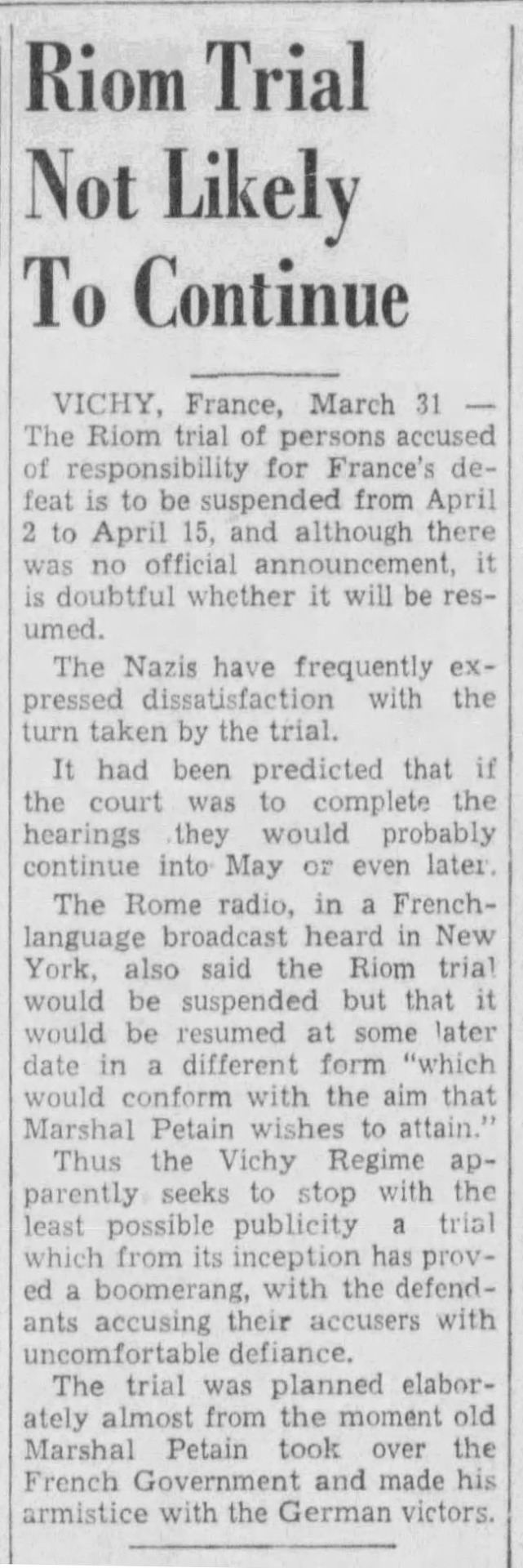
“Riom Trial Not Likely To Continue,” Kingston Whig-Standard. March 31, 1942. Page 5.
----
VICHY, France, March 31 — The Riom trial of persons accused of responsibility for France's defeat is to be suspended from April 2 to April 15. and although there was no official announcement. it is doubtful whether it will be resumed/
The Nazis have frequently expressed dissatisfaction with the turn taken by the trial.
It had been predicted that if the court was to complete the hearings. they would probably continue into May or even later.
The Rome radio, in a French language broadcast heard in New York, also said the Riom trial would be suspended but that it would be resumed at some later date in a different form "which would conform with the aim that Marshal Petain wishes to attain."
Thus the Vichy Regime apparently seeks to stop with the least possible publicity a trial which from its inception has proved a boomerang with the defendants accusing their accusers with uncomfortable defiance.
The trial was planned elaborately almost from the moment old Marshal Petain took over the French Government and made his armistice with the German victors.
#world war II#riom#riom trial#vichy france#régime de vichy#french collaborators#collaborators#third republic#procès de riom#farcical trial#show trial#battle of france#fall of france#marshal petain#l'étrange défaite
0 notes
Link
Spoiled wine
#France#Vichy#Petain#oligarchy#treason#fascism#Nazi#collaboration#oppression#colonialism#war#corporations#cartels#clergy#bankers
0 notes
Text

“I, the intellectual
I acted perfectly consciously, in the middle of my life, according to the idea I had formed of the duties of an intellectual.
The intellectual, the writer, the artist is not a citizen like any other. He has duties and rights which are superior to those of others.
This is why I took a bold decision; but in moments of turmoil the average individual is in the same situation as the artist. In those moments the State does not provide any definite direction or any aim which is sufficiently elevated. This is how it was in 1940. Marshal Pétain offered us unity, but that was all: it was a shadow void of content. So some brave men went to Paris, others to London.
Those who chose London have been more fortunate; but for the time being the last word has not been said.
I went to Paris and, together with a few other people, we decided to take it on ourselves to go beyond strictly national interests, to brave general opinion, to be in a minority regarded with hesitation, doubt, distrust, and, finally, to be cursed when our luck turned at El Alamein and Stalingrad.
It is the duty of the intellectual, or at least of some of them, to go beyond the event, to take risks, to try out the roads of History. If they choose the wrong moment, it is too bad. They have performed a necessary mission, that of being outside the crowd - whether before, behind, or beside, is of no consequence: what matters is to be outside. Tomorrow is not made of what one side has seen today. Tomorrow is made both of what the majority have seen and what the minority have seen.
A nation is not a single voice, it is a concert. There must always be a minority; and we were that minority. We lost, we have been stigmatised as traitors: that is right. You would have been the traitors if your cause had been defeated.
And France would have been no less France; Europe, Europe.
I am one of those intellectuals whose duty is to be in the minority.
Minority! We are several minorities. There is no majority. That of 1940 soon dissolved, and yours, too, will dissolve.
The resistance
So many minorities: The old democracy
The communists
I am proud of having been one of those intellectuals. Later people will lean over us in order to hear a sound different to the common sound. And this weak sound will grow louder.
I did not want to be an intellectual who prudently measures his words. I could have written in secret (I had thought of doing so), written in the free zone, abroad.
No, one must assume one's responsibilities, join impure groups, acknowledge that political law which obliges us to accept contemptible or odious allies. We must dirty our feet, at least, but not our hands. And this is what I did. My feet are dirty, but my hands are clean.
I did not indulge in any activity in these groups. But I joined them so that you could judge me today, so that you could pronounce a common, vulgar sentence. Judge me, then, since you are the judges or the jurors.
I put myself at your mercy. But I am sure of escaping from you in the long run. I am sure of finding a place of my own, in time, in the distant future.
But, when the time comes, you must judge me in full. That is why I am here.
You will not escape me, I will not escape you.
Be true to the pride of the Resistance as I am true to the pride of the Collaborators. Do not cheat me any more than I am cheating you. Sentence me to death.
No half measures, now. Thought had become easy and it has now become difficult again. Do not allow the former facility to return.
Yes, I am a traitor. Yes, I worked with the enemy. I offered the enemy French intelligence. It is no fault of mine if this enemy was not intelligent.
Yes, I am no ordinary patriot, no limited nationalist: I am an internationalist.
I am not only a Frenchman, I am a European.
You are Europeans too, whether you know it or not. But we played and I lost.
I demand the death penalty.”
#drieu la rochelle#pierre drieu la rochelle#secret journal#petain#marshal pétain#vichy#vichy france#collaborators#ppf#doriot#fascism#fascist#intellectual#suicide#death#dostoevksy#brothers karamazov#jünger#ernst jünger#storm of steel#books#bookshelf#library#wwiii
1 note
·
View note
Text
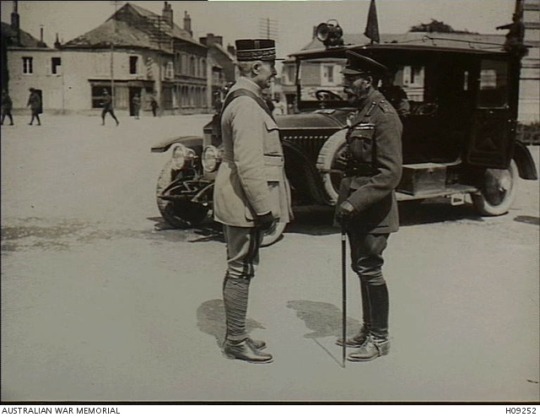
Albert, France. c. 1917. HMKing George V from England (on the right) and Marshal Petain, Commander in Chief French forces talking in the town square. (Donor British Official Photograph D1722)
33 notes
·
View notes
Text

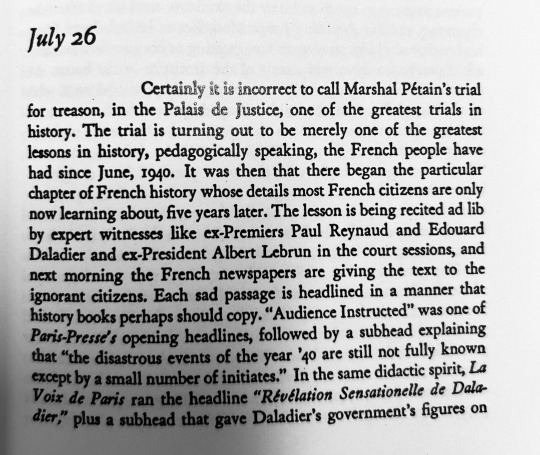
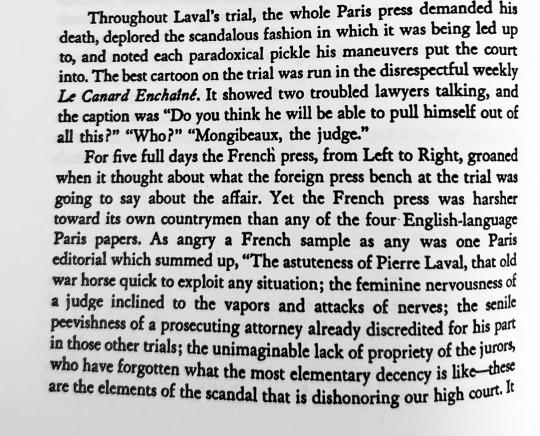
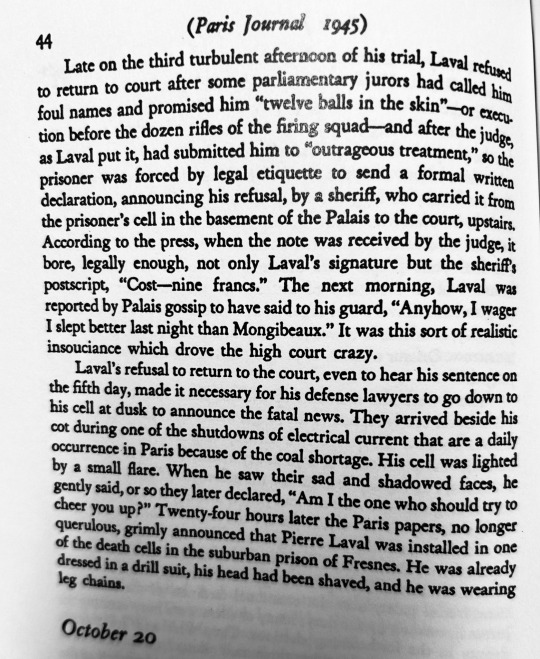
More interesting tidbits from Janet Flanner’s book relating to the recent extras casting call for women to play the wives of collaborators. In the summer/fall of 1945 there were two high profile trials of prominent Vichy collaborators, Philippe Petain and Pierre Laval. Both were convicted and Laval was executed by firing squad in October 1945. Petain was deemed too old by the court for execution and was allowed to serve in prison until his death. Louis and Claudia supposedly arrive in Paris in November 1945.
#iwtv#very interesting casting call I must say I didn’t think the show would use this part of the book
77 notes
·
View notes
Text
People who think the West’s support for Israel has anything to do with regretting the holocaust and wanting to support Jewish people are pathetic.
In France Eric Zemmour was in the protest and he was celebrated and people were chanting “Zemmour President” You know what Eric Zemmour said? That “Bugeaud who killed Arabs and even some Jews in Algeria should be celebrated and real French people should be proud of him”. For the record Bugeaud invented what could be called the very first Gas chambers. Women, children, elderly Algerians and livestocks were put in caves. The cave was then closed and they would start a fire at the entrance of the cave and feed it all night so the gas in the smoke would kill the people inside the cave. Zemmour is also a guy who has been condemned multiple times by justice for inciting hatred toward people based on their race or religion. He believes in the “Great replacement” you know the thing that was used as a justification in the West every single time mosques have been attacked. That same Zemmour considers that France was totally flawless in terms of protecting Jews during WW2. He said that Petain was a hero who protected Jews. When faced with someone who said that no Petain sold out Jews actually Zemmour said “No but Petain protected French Jews”. Petain removed the citizenship of thousands of Jews WITHOUT ANY DIRECT ORDER FROM NAZIS GERMANY to make them easier to deport and kill. That’s who Petain is I would never call him a hero he was a Nazis collaborator and a piece of shit but pro Israel protesters do think he is a hero.
Before the protest you know what people who support Israel in France were saying. “That’s what the Arabs want to do to us here they dream of it and if we don’t stop them and defend ourselves now we are next” but suuuuuuure this is all about the holocaust. Because you know nothing says “We regret the holocaust” like supporting a white supremacist colonial project against indigenous Palestinians and wanting to deport/kill all people you label as Arabs in your own country. All of that while supporting and celebrating a man who denied the role played by France during the holocaust and said we should celebrate the death of Jews at the hand of France in Algeria.
This has nothing to do with the holocaust and everything to do with colonialism. When the people at the protest in France chant “France, Israel we have a common enemy” and call for the death of that enemy they are not talking about Hamas cause Hamas was never a direct threat for France. They are talking about people like me. North Africans and Black people.
And this is not just France. I saw many videos of Pro Israel protests all over the world chanting “Death to Arabs” waving flags from Jewish supremacist organizations that call for the death of all Palestinians and Arabs.
But sure lie to yourself so you can sleep well and pretend this is all about supporting the poor innocent Israeli victims. After all they didn’t do anything wrong they just killed, tortured Palestinians. They just stole land from indigenous Palestinians. Put Palestinian children in cages. Used them as shield. Used phosphorus on civilians. Bombed schools and hospitals… Israeli are all soooo innocent they are just active participant to a settler colonial project that wants the end of the indigenous people of Palestine.
Last thing: If this was about trauma caused by the holocaust and about regretting what happened the one being forced to pay for it would be Europeans. Europe would be the one being forced to give up a part of its land not Palestinians who are in no way responsible for the holocaust. So cut the crap. This is all about white supremacy. Western imperialism and settler colonialism. This is colonization. Any support of colonization is a support for white supremacy nothing else.
33 notes
·
View notes
